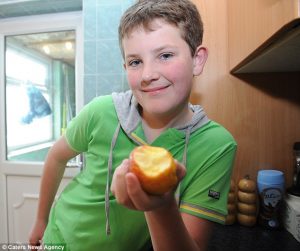Loses 17 kilos at 12: a little boy went on a diet by himself
 A twelve-year-old English boy suffered from being overweight and weighing 67 kilos. Tired of not being considered by his parents and feeling chubby and in trouble when he was doing PE with his classmates, Owen Clarke went his own way, and lost 17 pounds in a year by avoiding all chocolate-based snacks. bars, cookies and juices, and eating apples, low-fat yogurt, and raw vegetable snacks between meals. The story obviously has a double happy ending: Owen’s mother would have realized that she has a responsibility for feeding her son.and she would start cooking healthier for everyone, with the consequence that her husband would lose weight too. Owen is happy with his fifty kilos of weight and is an absolutely normal guy, who has become more active than before and now loves playing sports and outdoor life. End of story, but some questions remain.
A twelve-year-old English boy suffered from being overweight and weighing 67 kilos. Tired of not being considered by his parents and feeling chubby and in trouble when he was doing PE with his classmates, Owen Clarke went his own way, and lost 17 pounds in a year by avoiding all chocolate-based snacks. bars, cookies and juices, and eating apples, low-fat yogurt, and raw vegetable snacks between meals. The story obviously has a double happy ending: Owen’s mother would have realized that she has a responsibility for feeding her son.and she would start cooking healthier for everyone, with the consequence that her husband would lose weight too. Owen is happy with his fifty kilos of weight and is an absolutely normal guy, who has become more active than before and now loves playing sports and outdoor life. End of story, but some questions remain.
For example this: at 12 he is too young to take responsibility for his own diet.
CHILDREN ON DIET: IS THE Fault OF THE PARENTS?
Personally, having a history of childhood obesity, I cannot help but think that all those mothers who struggle to lose weight for themselves do not realize that their own diet will also have an effect on their children. The first cause of childhood obesity is undoubtedly to be found in the diet that children have at home, and only secondly in what they eat out of the wrong way. There is also the downside: boys and girls who live in a context where the mother constantly goes on a diet, will learn to fear food and develop the same problems as parents with their weight. For this reason, many children are arbitrarily put on a diet by their parents, even in spite of the doctor’s advice.
What is the solution? Again it is proper nutrition. Educating children to consume more fruit and vegetables between meals, perhaps involving them in both shopping and food preparation. Get them used to wholemeal food right away, and not to the omnipresent plate of pasta. Push them without obsessions to outdoor activities. Avoid treating chips and sweets as “sinful snacks”, giving them as a “reward” once or twice a month: I think this pushes them to want them even more, as opposed to an idea of healthy life, when it would be enough to cook a dish of fried or baked potatoes at home and a hamburger made with better meat and two slices of toasted whole-grain bread to neutralize the ongoing search for fast food.
It is also often the idea that, as children and young people have to grow up, they have a better and more robust metabolism, and can eat sweets without problems. Not only is this not true, but it means exposing them to an endless array of problems as they grow up.
This does not mean counting the calories of their dishes, but avoiding the same vices in the family’s diet as the personal one, taking food for what it is: nourishment. No to poorly nutritious, refined and industrial foods.





























+ There are no comments
Add yours